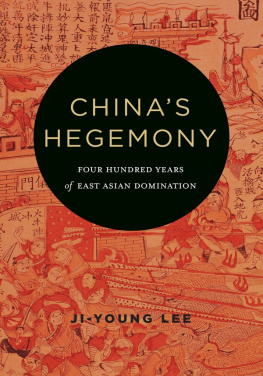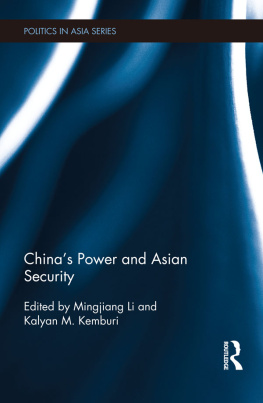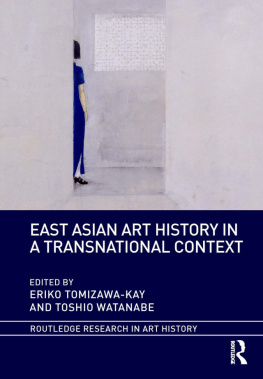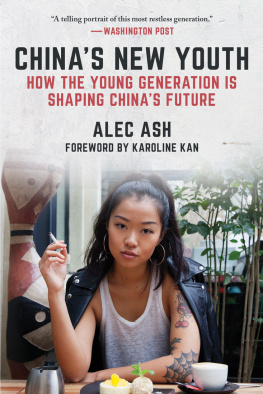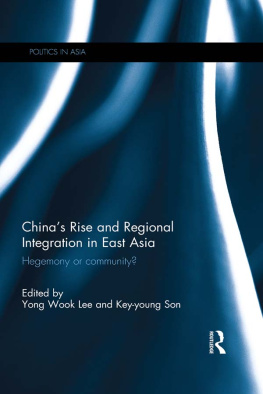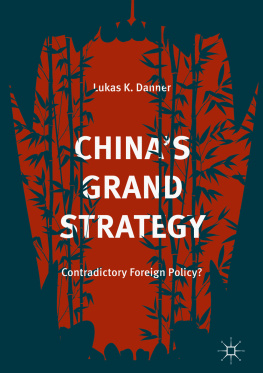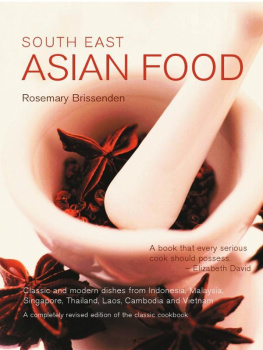Columbia University Press
Publishers Since 1893
New York Chichester, West Sussex
cup.columbia.edu
Copyright 2017 Columbia University Press
All rights reserved
E-ISBN 978-0-231-54217-3
Library of Congress Cataloging-in-Publication Data
Names: Lee, Ji-Young (Professor of East Asian studies), author.
Title: Chinas hegemony : four hundred years of East Asian domination / Ji-Young Lee.
Description: New York : Columbia University Press, 2016. | Includes bibliographical references and index.
Identifiers: LCCN 2016008191 | ISBN 9780231179744 (cloth : alk. paper)
Subjects: LCSH: HegemonyChinaHistory. | ChinaForeign relationsEast Asia. | East AsiaForeign relationsChina. | ChinaForeign economic relationsEast Asia. | East AsiaForeign economic relationsChina. | East AsiaPolitics and government.
Classification: LCC DS518.15 .L44 2016 | DDC 327.5105dc23
LC record available at https://lccn.loc.gov/2016008191
A Columbia University Press E-book.
CUP would be pleased to hear about your reading experience with this e-book at .
Cover design: Rebecca Lown
Cover image: Private Collection/Bridgeman Images
S omeone reminded me recently that the two Chinese characters that denote scholarship () are to study and to question. It is only with many debts of gratitude, which I have incurred over many years, that this book has been written. At Georgetown University, I was extraordinarily fortunate to work with remarkable scholars of international relations (IR). Kathleen McNamara has shown unwavering support for and faith in this project. I am deeply grateful that she always inspires me to think more clearly and never to lose sight of the big IR picture. Daniel Nexons scholarship on early modern Europe was an invaluable resource for me as I explored the international system of early modern East Asia. It is thanks to Andrew Bennetts steadfast encouragement and training that the book highlights the importance of the rigor of social science methods as it explains the evasive phenomena of authority and hierarchy often buried in numerous historical details. Victor Chas research and expertise on Asian IR have shaped my thinking on Asia in important ways. Simply put, his guidance and mentorship have been indispensable.
Outside of Georgetown, this project has benefited from advice from David Kang and Patrick Jacksonthe two scholars whose intellectual influence on this project significantly improved the ways in which I asked and approached my questions. I still remember the excitement I felt when I first read David Kangs article Getting Asia Wrongperhaps the topic of this book had been decided at that very moment. Patrick Jacksons sociological approach to big IR questions helped sharpen my own thinking on the notions of hegemony, political order, and legitimacy. For that, I owe him special thanks.
My thanks also go to several historians on the Asian history front. Without their kind suggestions and insights, any remaining shortcomings of the historical detail in this work might have been greater. Since the initial stages of the project, Kirk Larsen has generously offered guidance on multiple occasions exactly when I needed it. As I was swimming through rich historical details, Gari Ledyard and John Wills carefully read my conference paper and shared valuable suggestions, which proved consequential for this book. For example, I have cited the original classical Chinese texts as well as their Korean translations, for other researchers who read Chinese but not Korean. Young-sun Ha, Myng-gi Han, Christine Kim, Tae-yl Ku, Sng-bm Kye, James Millward, Tae-gyun Pak, Wn-ho Pak, Sng-chl Son, and Kn-ho Yu all took the time to talk to me in person, which has been very helpful. I also wish to thank historian Han-gyu Kim for translating Chinese tributary envoys reports and essaysShi Chaoxian lu (Beijing: Beijing Tushuguan Chubanshe, 2003)into Korean. Reading this multivolume publication in 2012, and using Korean tributary envoys writings, was a turning point in grounding my analysis of the concept of hegemony more firmly in empirical evidence. Deborah Solomon has generously taught me how to deal with the historical documents, for which I am very thankful.
Many of my colleagues kindly read portions of this project at different stages. For their comments and suggestions, I am grateful to Celeste Arrington, Boaz Atzili, Michael Green, Todd Hall, Pek Koon Heng, John Owen, Gilbert Rozman, Kaya Sahin, Hendrik Spruyt, Matthew Taylor, Yuan-Kang Wang, Andrew Yeo, and the anonymous reviewers at Columbia University Press. In particular, I would like to acknowledge Julia Lau for her feedback and constant support. I am also grateful to colleagues at Oberlin Colleges Politics Department and East Asian Studies Program for warmly welcoming me as a Mellon Postdoctoral Fellow and a Visiting Assistant Professor. It was during my time at Oberlin that I began seriously looking into primary source documents of Asian history. My arrival at American Universitys School of International Service, where much of the work for this project was done, meant that I was part of a vibrant intellectual community. It is not an exaggeration when I say that I could not have come to the publication of this book without my colleagues kind support, help, and advice. My appreciation goes to Amitav Acharya, Chuck Call, Christine Chin, Ken Conca, Michelle Egan, Carole Gallaher, Miles Kahler, Randy Persaud, Rachel Robinson, Cathy Schneider, Sarah Snyder, Jordan Tama, Paul Wapner, Sharon Weiner, and John Zhao, among many others. I wish to thank Dean Jim Goldgeier for encouraging me to focus on my research during the writing of this book.
This project has been presented at several institutions, including Beijing University, Fudan University, Hankuk University of Foreign Studies, Keio University, the East Asia Institute, the Social Science Research Council (SSRC) Inter-Asian Connections, the University of British Columbia, the University of Southern California, and the annual meetings of the American Political Science Association and the International Studies Association. I am very grateful for the comments from the seminar and conference participants. In addition to support from the Andrew W. Mellon Foundation, which funded my position at Oberlin, the project received generous support from the Academy of Korean Studies under grant AKS-2013-R74, the Social Science Research Council, and the EastWest Center. I would like to thank the EAI Fellows Program on Peace, Governance, and Development in East Asia supported by the Japan Foundation, the Chiang Chingkuo Foundation for International Scholarly Exchange, and YBM/KIS for supporting travel and research. I have also been very lucky to enjoy great research assistance from several brilliant graduate students: Eleni Ekmektsioglou, Sarah Flewelling, Ji Young Kwon, Weini Li, and Brendon Thornton.
I am delighted that my book found its home at Columbia University Press. I appreciate Anne Routons kind support and help throughout the whole process. My sincere thanks also go to Nigel Quinney for his help with edits for the manuscript. A version of parts of the books argument has appeared in my article Hegemonic Authority and Domestic Legitimation, published in the June 2016 issue of


